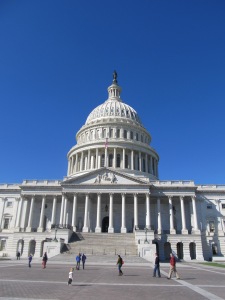 Today, the U.S. Senate voted, largely along party lines, to eliminate the filibuster for most judicial nominees and executive office appointments. This means, practically, that a simple majority vote will be needed both to close off debate and confirm these nominees. Previously, as with other matters, 60 votes were needed to bring matters to a vote. The new rule does not apply to legislation or Supreme Court nominees.
Today, the U.S. Senate voted, largely along party lines, to eliminate the filibuster for most judicial nominees and executive office appointments. This means, practically, that a simple majority vote will be needed both to close off debate and confirm these nominees. Previously, as with other matters, 60 votes were needed to bring matters to a vote. The new rule does not apply to legislation or Supreme Court nominees.
Democrats exercised the so-called nuclear option, of changing Senate rules by a simple majority, when historically a 2/3 vote was needed for such changes, due to the Republicans’ repeated threat of the filibuster over three of President Obama’s D.C. Circuit Court nominees. Terming it an ‘evolution’ for the body, Majority Leader Harry Reid (D-NV), argued that Republican obstructionism required the move. Needling, ‘If you like your Senate rules, you can keep them,’ Mitch McConnell (R-KY) claimed ‘It’s a sad day in the history of the Senate.’
Complicating the matter, or cementing the irony, is the reversal of roles for both McConnell and Reid, who were advocating precisely their opponents’ arguments in 2005. Democrats then were freezing President Bush’s judicial nominees, rankling the Republicans in the process.
Why does this matter? Perhaps it does not, but I fear it does. The U.S. Senate, as it was originally conceived, was to operate as a brake on the democratic passions of the people. This is why Senators were chosen by state legislatures, served six-year terms, and had more stringent age and residency requirements for service. While the filibuster is not part of the Constitution, for it is a creature of the chamber’s rules, the convention reflects the document’s sentiments. Senators not only had to clear different hurdles for office, but they were empowered with the gravest of responsibilities. The Senate, and only the Senate, ratifies treaties, tries impeachments, and confirms presidential nominees. None of this should be read to minimize the House as the people’s mouthpiece, but the Senate was supposed to turn that cacophony into a deliberative harmony. To put it candidly, the U.S. Senate was a vestige of aristocracy in the new form of government, a manifestation of the Founders’ general wariness of democracy’s instability.
As Tocqueville prophesied, the way of the West is tilted toward democracy, leaving the old world in ruins. The filibuster, which has been abused by both parties, and its 60 vote requirement, defies the majoritarian logic endemic to democracy. During the last century, the people, and not the states, were invested with the selection of Senators. Since then, the two chambers have been, I suspect, creeping toward one another.
We have also witnessed a slow but steady erosion of institutional pride. The Senate’s Democrats under Obama, like the Republicans under Bush, are too quick to view themselves as extensions of the White House. Both parties have been too quick to accede to presidential agendas with, it seems, little regard for the institutional impact. This has weakened our separation of powers and has only increased the authority of the Colossus who resides at 1600 Pennsylvania Ave.
 Bert Wheeler
Bert Wheeler
 Jeff Haymond
Jeff Haymond
 Marc Clauson
Marc Clauson
 Mark Caleb Smith
Mark Caleb Smith
 Tom Mach
Tom Mach